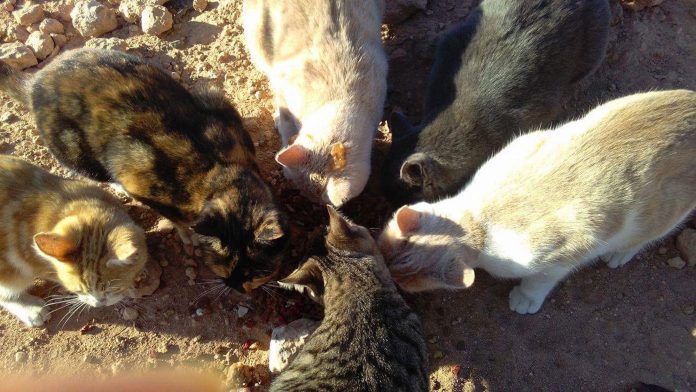Animal welfare charity, Cruz Azul, is continuing its work to maintain control over cat colonies in the Murcia region. Following successful campaigns in Sucina village and El Valle Golf, they are working with animal lover, Lorraine Oram, in the San Pedro campo.
Lorraine first came to Cruz Azul for help when she found a little dog who had been stabbed and left to die. The charity paid for his sterilisation, microchip and vaccinations and he was adopted by the lady who cared for him following his life-saving surgery.
Recently, Lorraine discovered a large cat colony near her home and paid to have three of them neutered. She did not have funds to sterilise all thirteen cats but knew Cruz Azul supports Trap-Neuter-Return (TNR) campaigns and asked for their help. Cruz Azul has initially pledged 300€ to sterilise as many as can be caught and will continue to support Lorraine until the whole colony has been neutered.
“TNR is the most humane way of dealing with cat colonies” said charity VP, Sue. Cruz Azul are committed to helping people who want to do this rather than cats suffering horrible deaths from being poisoned. That is just barbaric and as TNR is proven the world over, we are happy to promote and support it.”
Trap-Neuter-Return means the cats are humanely trapped in their colony, taken to a local vet to be sterilised, ear-clipped and vaccinated under anaesthetic, then returned to their colony site. Ear-clipping is to indicate the cat has been sterilised. Cats are normally returned to their colony on the same day with good antibiotic protection.
When it comes to reproduction, cats are prolific breeders. One female kitty can produce an average of 12 kittens each year if not spayed. Once a kitten reaches puberty, typically between 5 and 9 months of age, she will be able to reproduce. Some kitties mature as young as 3½ months old, usually after they reach around 2 kilos in weight. In warm climates such as ours, the females can remain in heat all year-round.
Cruz Azul Murcia is happy to help local communities control their cat colonies.
Co-operation between neighbours is the key to a successful campaign: raising funds for the operations and co-ordinating the Trap-Neuter-Return campaign, following the guidelines that Cruz Azul Murcia provides.
Cruz Azul is supported by the World Veterinary Service, who have provided traps for this purpose. These are available on loan from the Cruz Azul Centre in San Javier and volunteers are happy to take everyone through the correct procedure.
If you would like to know more, please give Sue Thomason a call on 693 017 616.
Cruz Azul Murcia is a registered charity (No. 11.720/1a) and exists to provide veterinary care for the sick and injured pets of people in need and to promote responsible pet ownership.
If you or someone you know needs help, or you would like to volunteer or donate, please call 693 017 616 or visit their website: www.cruzazulmurcia.es





